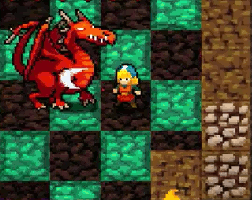Our family wasn't necessarily poor in any sense, but we definitely were struggling. We had never had a computer in the house, and I had to beg for years just to get a Super Nintendo. Usually I would have to play video games at a neighbors or at a relatives house. But at JEEP, they brought us into a room FILLED with computers, and my eyes lit up like it was Christmas.
I spent my days after school enthralled in games like: Prince of Persia, Oregon Trail and The Secret of Monkey Island. However there was one that stuck with me most: Treasure Mountain by the Learning Company. Not only was it extremely fun, but it taught mathematics, analogies, and logic puzzles. The learning was built around fun adventures, collectible treasure, and a joyous soundtrack that immersed the player into the game. It really stuck with me through the years, and I am convinced that Treasure Mountain, and the JEEP program, were the reason for my passion and drive for video games.
 |
| 8-bit graphics, so what? This game was amazing! |
But in today's culture, with all of the ultra-violent and realistic games out there, is there truly any room in the market for a engaging, educational and most importantly FUN game?
The Verdict: Yes, there are a bevy of fun, educational games out there, that are not only appropriate for all ages but fun for children and adults both! The best way to make sure your child is participating in appropriate gaming behaviors is to ENGAGE with them, be INTERESTED in their passions. ASK them what they are doing, and WHY these games are fun for them.
There are plenty popular, fun, age-appropriate and educational games that you can get your child involved in.
Games like the ever-famous Minecraft, which teaches reading, writing, geometry, spatial reasoning, patterns, architecture and social skills. Or Sid Meyer's Civilization series, which teaches geography and non-fictional history.
 |
| This magnificent Minecraft castle is completely player created, brick by brick! |
I could speak for hours about the good and bad of gaming, and its contributions to education, but I think that it would be more worthwhile for you to form your own opinion, do your own research, and come up with your own decisions! However, WASD is a gaming blog, and we want to make gaming an every-day thing for even kids and parents. We are going to be giving away two items in the next week to further encourage parents to get involved in educational gaming and teaching their children the right way to play!
We are giving away up to (2) copies of Minecraft (iPhone/iPad editions) and (2) copies of Brainversity Learning on iOS.
The rules for this giveaway are simple:
1. You must comment on this page (bottom of the page - with your first name and last initial (ie Cathy M) to be entered - This is the only REQUIRED step.
2. You will gain extra entries (up to 4 total entries) if you do any of the following. We have catered it so you can follow us on Facebook or Twitter, and still get the max entries. (OR BOTH!)
- Follow me on twitter @wasd_blog (+1)
- Retweet this post (+1)
- Favorite this post (+1)
- Join the Facebook Group (+1)
- Like this post on Facebook (+1)
- Share this post on Facebook (+1) #WASDgiveaways for tracking
The entries will be valid starting at 11AM PDT on Saturday, May 2nd 2015, and will be tallied on Friday, May 8th. The winners will be announced on May 9th and prizes will be awarded shortly after. If you win a prize you MUST provide an Apple ID upon winning to receive a prize (this can be done by private message). Currently we are only providing prizes for iOS compatible devices, and some restrictions may apply.
These are the details for the four products I am giving away:
Thanks for reading and good luck to all of our entries!
Over and Out,
Adam @ WASD Blogs
Adam @ WASD Blogs









